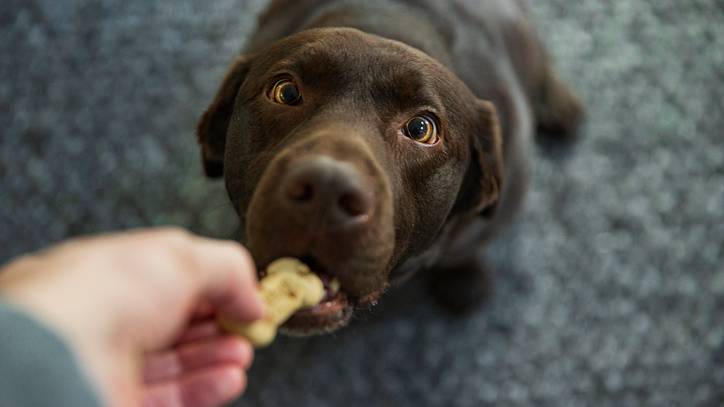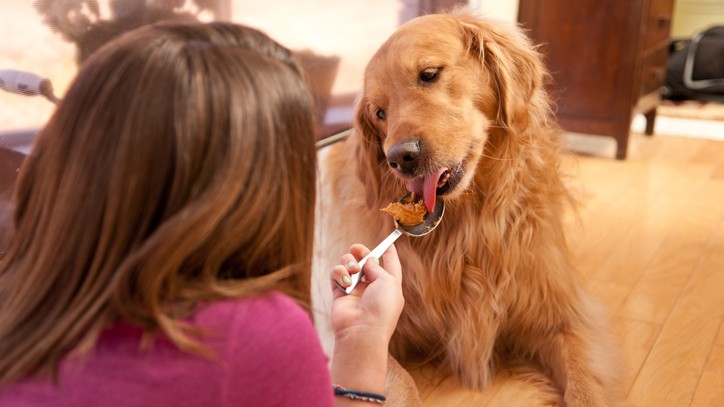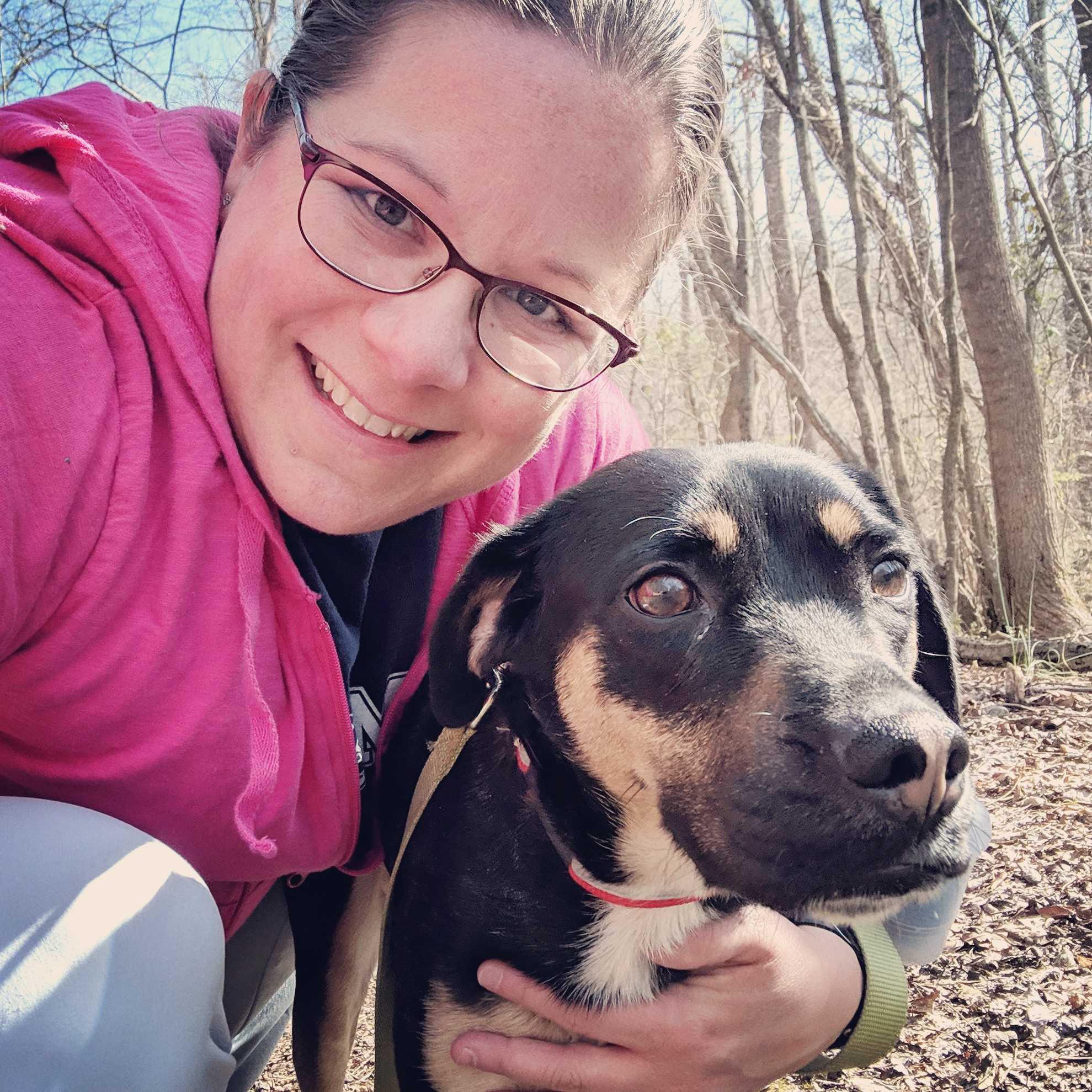Are dog treats healthy? How much is too much?
They are a canine staple, but are dog treats healthy for your pup?

Get the best advice, tips and top tech for your beloved Pets
You are now subscribed
Your newsletter sign-up was successful
As a vet, I often have clients ask me, “Are dog treats healthy?” We love to give our dogs treats, whether it’s for good behavior, an extra snack, or just for looking extra cute, we all throw our dogs a biscuit every now and then.
But are dog treats actually healthy for your dog? And could those extra snacks be doing more harm than good? If your dog is overweight or obese, it may be time to consider switching to an alternative reward to help keep your pup healthy.
Dog treats aren’t a required part of your dog’s daily diet and they can lead to excess weight gain. If you do decide to give dog treats, make healthy choices and give them in moderation to ensure your canine companion maintains a lean and healthy body weight. Read on for more tips on treats for your dog.
Are dog treats necessary?
Although we love to give our dogs treats, they aren’t necessary to keep our dogs healthy and happy. Your dog should primarily be eating a complete and balanced diet appropriate for his or her age and breed. While it’s okay to give treats occasionally, too many treats can lead to excess weight gain.
Unfortunately, many pets suffer from being overweight. According to the Association for Pet Obesity Prevention, more than half of all dogs and cats in the United States are classified as overweight or obese. To help prevent your dog from becoming overweight or obese, it’s best to stick to your dog’s regular diet and avoid adding extra calories in the form of treats, table scraps, or other extra foods.
The consequences of obesity
A few extra pounds may not seem like much, but they affect more than just your dog’s waistline. Carrying extra weight can predispose your dog to conditions such as arthritis, heart disease, diabetes, and even cancer.
In fact, one study showed that Labrador Retrievers who maintained a healthy weight lived nearly two years longer on average compared with their overweight counterparts. Clearly, being overweight can have serious impacts on your dog’s health.
Get the best advice, tips and top tech for your beloved Pets
To keep your dog healthy and happy, maintaining a healthy lean body weight is a must. To find out whether your dog is overweight, ask your vet about your dog’s body condition score. A body condition score is a subjective measure of your dog’s body fat.
Your vet will determine whether your dog is overweight, underweight, or an ideal weight by palpating the fat deposits over his or her rips, hips, and spine. If your vet determines that your dog is overweight, it’s best to limit or avoid treats in your dog’s diet to prevent further weight gain.
Adding treats to your dog’s diet

If you do decide to add treats to your dog’s diet, make sure you do so in moderation – and you choose the best dog treats or best puppy treats you have available. A good rule of thumb is that treats, table scraps, food toppers, and other supplemental foods should make up no more than 10 percent of your dog’s daily calorie intake. The remaining 90 percent should be a complete and balanced diet.
To help reduce the calories your dog receives from treats, consider breaking treats in half, using pieces of kibble as treats, or switching to healthier low-calorie alternatives. Doing so will reduce the risk of excess weight gain and ensure your dog remains healthy.
Choosing healthier dog treats
Many pet owners are surprised to discover that some dog treats are extremely high in calories. Making healthier choices for your dog can go a long way towards maintaining a lean body weight. Try offering your dog fresh, low-calorie options such as:
- Carrot
- Sweet potato
- Blueberries
- Watermelon
- Apple
- Banana
- Cucumber
If your dog doesn’t like fruits and vegetables, single-ingredient treats such as freeze-dried liver can be a great option that is tasty and low in calories. Many dogs will also accept their own daily dog kibble as treats, which makes it easy to measure out the daily portion of food and surprise your dog with these “treats” throughout the day without adding any additional calories to their diet.
Here’s how to make your own homemade dog treats.
Don’t forget non-food rewards
Remember, treats aren’t the only way we can show love – dogs also love to be praised, petted, and played with. These non-food options can be just as rewarding as receiving a treat but without the excess calories.
The next time your dog does something worth rewarding, try offering him or her some playtime with a favorite toy instead of giving a treat. Many dogs also love attention and are willing to work for a good round of petting and praise. Your dog will still be getting a positive reward, and will also get some exercise and added mental stimulation to go with it.
Limit treats for a healthy diet
It is okay to give your pup the occasional treat, but the key is to do so in moderation. Too many treats can lead to weight gain and be the culprit behind obesity in many dogs and cats. To help ensure your dog doesn’t pile on the pounds, limit treats to no more than 10 percent of your dog’s daily calorie intake and choose healthy, low-calorie alternatives such as fresh fruits and vegetables over traditional dog treats.
If your dog is overweight or obese, eliminating treats entirely is best, but this doesn’t mean your pup has to go without rewards. Non-food rewards like petting, praise, and playtime are great ways to show love without giving extra calories. As always, if you are concerned about your pet’s weight or overall health, consult your vet for further care and advice.
Dr. Barnette is a graduate of the University of Florida, where she received both her B.S. in Zoology and her Doctor of Veterinary Medicine (DVM). She has 15 years of clinical experience as a small animal veterinarian, treating dogs, cats, and occasional exotic patients. She now works as a freelance veterinary writer, creating educational content for veterinarians, veterinary team members, and dedicated pet owners. Dr. Barnette lives in southwest Florida with her husband and daughter (plus two cats, a dog, and a rescued dove!) and enjoys kayaking, biking, and hiking. Learn more about Dr. Barnette at www.linkedin.com/in/catherinebarnette.

